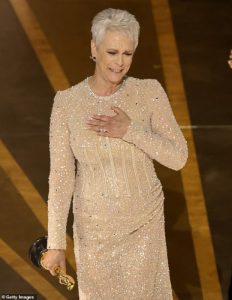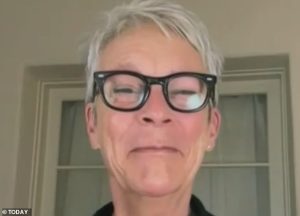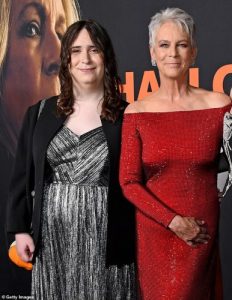Few actors in Hollywood deserved a win during the Academy Awards celebration as much as 64-year-old starlet Jamie Lee Curtis. The 64-year-old actor has played roles spanning multiple genres and types and is about as versatile an actor as they come. But while speaking to the Today show about her Best Supporting Actress win, Jamie Lee Curtis broke down in tears as she explained that she would refer to her Oscar statue as “they” and “them” in honor of her transgender daughter Ruby.
Curtis won the Best Supporting Actress award for her prize-winning role in Everything Everywhere All at Once. On Tuesday, a few days after her big win, Curtis broke down in tears during the early-morning appearance on the Today show. While speaking to hosts Savannah Guthrie and Hoda Kotb, she confessed that this viewing was the first time she saw herself accepting the Academy Award at the ceremony.

“I hadn’t watched that,” she said while wiping away her many, many tears. “So, that was the first time I’ve seen it.”
Jamie Lee Curtis then lifted up her Oscar statute to show the camera via her video link from Los Angeles. She next said that she would consider her statue not to be male but to be non-binary. She would refer to the statue as they and them instead of he and him in honor of her daughter, who has gone through a transgender transition in recent years.

“Here they are!” she said while petting the award and then pressing it against her face. “In support of my daughter Ruby, I’m having them be a they/them. I’m just going to call them ‘them,’ they/them. And they are doing great. They are settling in.”
Jamie Lee Curtis and her husband, Christopher Guest, have two children together. The concerned mother first revealed that her daughter Ruby was a transgender woman back in July 2021. In a conversation with AARP magazine, Curtis said that she and her husband “watched in wonder and pride as our son became our daughter Ruby.”

After her win on Sunday, Curtis spoke to backstage reporters about the need for genderless categories for actors.
“Obviously, I would like to see a lot more women be nominated so that there’s gender parity in all the areas and all the branches, and I think we’re getting there. We’re not anywhere near there. And, of course, inclusivity, then that involves the bigger question, which is, how do you include everyone when there are binary choices, which is very difficult. As the mother of a trans daughter, I completely understand that.”
However, she does not believe the gendered categories should go away overnight because that would likely mean there would be more male winners.
“And yet, to de-gender the category, also, I’m concerned [that] will diminish the opportunities for more women, which is something I also have been working hard to try to promote,” she said. “So it’s a complicated question, but I think the most important thing is inclusivity and more women.”





